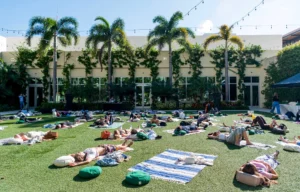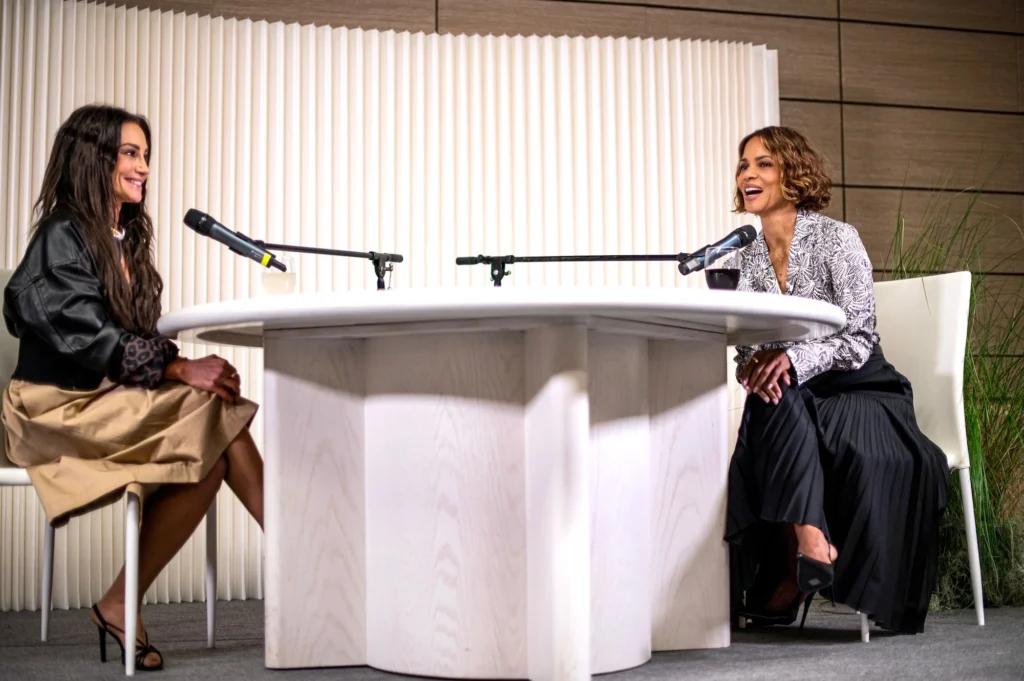
From the importance of community to the implications of AI in healthcare, these were the most important conversations we heard at Eudēmonia
Eudēmonia Summit returned to West Palm Beach, Florida, last weekend with 5,000 attendees and more than 150 experts in neuroscience, longevity and functional medicine, delivering upon the growing demand for trustworthy, science-backed information in an increasingly noisy wellness landscape.
When you’re on the quest to live a long life you love, it’s easy to get lost in many rabbit holes that promise a silver bullet. However, what helps with navigating that maze is finding the experts you can trust. Not on TikTok, not on Instagram, but in real life.
Across three days of talks, workshops and a nerd-worthy expo, the Summit delivered exactly that. Athletech News breaks down five of the biggest health and longevity takeaways we walked away with.
Find Community & Purpose
Amidst the back-to-back talks, a vendor hall filled with countless health and longevity solutions, one of the biggest highlights for the majority was community and purpose. Attendees said they came mostly for the people they met and the sense of shared meaning they felt over three days.
From functional medicine leader Dr. Mark Hyman to Blue Zones founder Dan Buettner, several talks emphasized how connection and purpose are not a “nice-to-have” but a key pillar of longevity.

“The new luxury isn’t a watch or a nice dress — or even an experience — but transformation,” SHA Wellness Clinic vice president Alejandro Bataller told Athletech News. “An experience has a beginning and an end. But transformation is when you have that amazing experience, yet at the same time, you reach a turning point in some aspect of your life. And health and well-being symbolize this better than any other sector — how you can make your free time more meaningful.”
Optimize Metabolic Wellness
Whether it’s supporting your mitochondria through quantum technology or shaping a microbiome that works in your favor, optimizing how your body turns fuel into energy is a must. That message echoed across more than a dozen talks and presentations. Even Halle Berry took the stage to share her journey and how much her life improved with fixing her gut and metabolic health.
“There are 40 trillion microbes that live in our gut, so what happens in the gut doesn’t stay in the gut,” Naveen Jain, founder and CEO of the microbiome testing company Viome told ATN, noting that through the gut-brain axis, the gut also impacts ADHD, anxiety, addiction and depression.
Additional downstream effects of metabolic wellness span immune function, mental resilience, sleep, recovery and even how your body responds to stress. And while protocols differ, finding your metabolic health plan is essential to long-term vitality.
Berry’s stance echoed that sentiment as she referred to her gut as her “first brain,” saying, “I’m gonna protect that at all costs.”

From advanced stool testing, AI diagnostics and microbiome mapping to fasting protocols, fermented foods and targeted supplementation, no question was left unanswered when it came to improving digestion, reducing inflammation and restoring microbial diversity.
Upregulate Parasympathetic Activity
We all need to find more ways to chill more often. We live in an attention economy where almost everything, from our phones to our workloads, is designed to keep us alert, reactive and operating in a near-constant state of fight-or-flight.
After walking the “Exposome” floor for three days and sitting in on workshops, there seemed to be a growing emphasis on rebalancing the nervous system and upregulating parasympathetic activity.
There were sessions dedicated to practices that have sustained human resilience long before “biohacking” existed, such as meditation, breathwork and slow intentional movement. Plus, there was also a wave of advanced modalities, from stacked therapies combining light, sound, vibration and molecular hydrogen to mindfulness and vagus nerve stimulation devices, offering a total nervous system reset.
“Your innate intelligence knows how to unlock who you are, but stress is holding you back,” Patrick Porter, PhD, founder of a mindfulness technology called BrainTap, told ATN, noting that only 5% of people who try to meditate will continue because it’s such a stressful event with our monkey mind taking over as soon as we close our eyes.
“We need energy at the brain level, so we’re combining different light and sound frequencies to energize the brain. Once you have that, you start having a whole different meditation experience,” Porter said.
Is AI a Double-Edged Sword?
Artificial intelligence showed up throughout the event as both a valuable tool and a tech to rely on with caution.
On the functional medicine side, Dr. Hyman described AI as a “co-pilot” that could help individuals and clinicians synthesize complex data, personalize care long-term and make early detection more accessible.
However, outside of the clinics, people at home are chatting with bots and consulting with ChatGPT on a myriad of personal matters, which worries some experts who study human psychology.
Psychiatrist and author Dr. Gregory Scott Brown drew from the Harvard Study of Adult Development, the world’s longest-running study on happiness, which found that the quality of our relationships is one of the strongest predictors of long-term well-being.
As AI is changing how we communicate, socialize and form attachments, Dr. Brown cautions that over time, these technological advances may take a toll on our mental health and the way we connect to people around us.
Don’t Ignore The Basics
Health optimization can get overwhelming and expensive fast, and it’s easy to get swept up in the promise of high-tech shortcuts. However, several conversations highlighted that without a solid foundation, all the “hacks” will likely not move the needle. Or at least not that much.
Speakers reinforced that you can’t out-gadget or out-supplement your way past poor nutrition, inadequate sleep, chronic stress, sedentary habits, a toxic environment or a lack of meaningful social connection. These fundamentals might sound “boring”, but they’re the infrastructure that makes every other intervention more effective.
Sean Hoess, Eudēmonia’s founder and CEO, shared a personal story that was a perfect example. When he started using peptides to help heal a “nagging” knee injury about six months ago, the peptides worked, but not in isolation.
“The act of self-care that that represented also carried through a million other factors in my own health and well-being,” Hoess told ATN, reflecting that he also stopped drinking, improved his sleep and several other aspects of his health after starting peptides. “That was my entry point to really double down on my health, and (I) had great results.”
